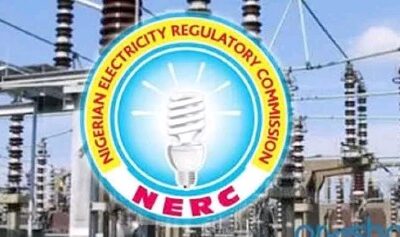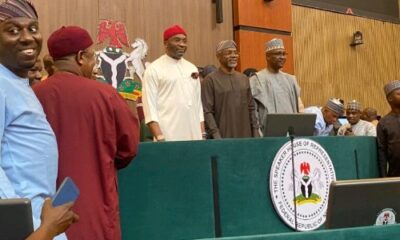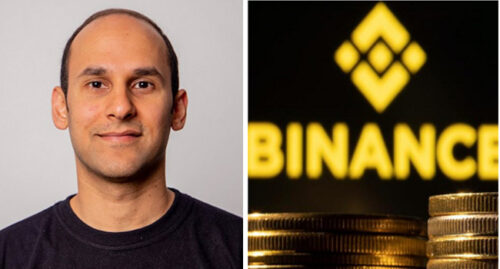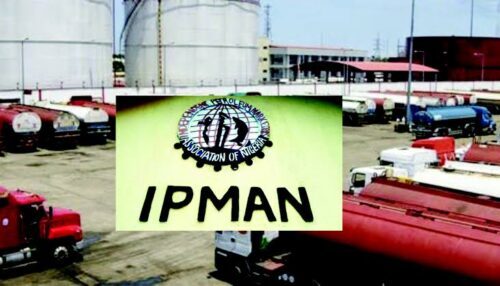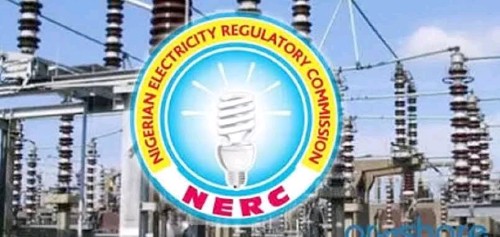- No more subsidy – NNPCL Insists
The Nigerian National Petroleum Company Limited (NNPCL) and the Federal Government’s Ministry of Petroleum Resources have declared that the numerous assertions made by various people and organisations regarding the purported restoration of fuel subsidies are untrue.
The administration emphasised that since President Bola Tinubu declared the end of the petrol subsidy, the situation has not changed and challenged individuals who make this argument to present proof to support their claims.
The Minister of State for Petroleum Resources (Oil), Heineken Lokpobiri, stressed that fuel subsidy was a sensitive issue, but noted that the government had made its position known on the matter.
When contacted for the reaction of the Minister of State for Petroleum Resources (Oil), Heineken Lokpobiri, on the matter, his media aide, Nneamaka Okafor, provided a video clip where her boss reacted to the claims of the former Kaduna governor and marketers.
In the clip, Lokpobiri insisted that petrol subsidy had ceased to exist, and urged those who alleged that the government was still subsidising the commodity to provide evidence and facts.
The minister said, “I don’t want to delve into that issue. It is a very sensitive issue. It is better we get all the facts. As far as I’m concerned, the President removed the subsidy and it remains removed till today. Anybody who is saying that subsidy is being paid, it is left for the person to bring the facts and then we will talk about them.”
Asked whether the price being paid for petrol currently is determined by market forces, the minister replied, “It may not be determined by market forces but let us deal with the price as it is today.
“Every government has a duty to do certain things, not only in the petroleum sector but in several other sectors, to be able to cushion the effect and burden on Nigerians.”
The NNPC also said it was recovering its full cost on the petroleum products that it imports into Nigeria, and insisted that there was nothing like petrol subsidy any more. NNPC is the sole importer of petrol into Nigeria currently.
Their comments came as oil marketers backed the claim by the immediate past Governor of Kaduna State, Nasir El-Rufai, that the Federal Government had resumed the payment of subsidy on Premium Motor Spirit also called petrol.
Oil dealers also pointed out that the current cost of PMS at filling stations should be around N900/litre if there were no subsidy on the commodity.
This price, according to them, is because of the recent appreciation of the naira against the United States dollar.
The pump price of petrol is currently between N600 and N700/litre depending on the area of purchase.
El-Rufai had told journalists in Maiduguri on Monday that many citizens were not aware that the government had reintroduced the PMS subsidy.
“The Federal Government is now subsidising fuel; many people don’t know this. It is the right policy. I have always supported the withdrawal of oil subsidies; but in the course of implementing the policy, the government realised that subsidy has to be back; right now, the government is paying a lot of money for subsidy, even more than before.
“You start implementing a policy because you are sure it is the right policy, but in the course of implementation, you come across bottlenecks, and you modify.
“The keyword in leadership, in my view, is pragmatism. You should be pragmatic. So when you make a policy, you start implementing it, and it doesn’t seem to work well. You should have the humility to stand back and say this is not working, and you modify it,” the former governor stated.
Reacting to this on Wednesday, oil dealers under the aegis of the Independent Petroleum Marketers Association of Nigeria (IPMAN), stated that what the former governor said was not far from the truth.
They argued that the subsidy on petrol kept rising as the exchange rate of the United States dollar increased, stressing that the government spent more on the PMS subsidy at the time the dollar exchanged for about N1,500.
The marketers, however, noted that since the local currency started appreciating against the dollar, the subsidy on PMS had been on the decline.
This, according to them, is because the dollar remains the major component that influences the cost of petrol, as Nigeria imports the commodity through NNPC Ltd.
The Public Relations Officer, IPMAN, Chief Ukadike Chinedu, told our correspondent that petrol prices at the pumps should be around N900/litre.
“I’ve said before that the PMS subsidy had been returned, and the government said it was a lie. I said before that the government is subsidising PMS and it is on till this moment. I said before that what the government was doing was quasi-subsidy and that has not changed,” Ukadike stated.
When asked what would have been the landing cost of petrol at the depots and tank farms if there was no subsidy on the commodity, he replied, “Going by the steady appreciation of the naira against the dollar lately, the amount being spent as subsidy on petrol should be on the decline.
“Since the dollar is currently around N1,000, then PMS landing cost should be around N800/litre, while the cost at the pumps should be nearing N900/litre.”
But the Chief Corporate Communications Officer, NNPC Ltd, Olufemi Soneye, insisted that the national oil firm had stopped subsidising petrol.
“We are recovering our full costs from the products we import. It is important to emphasise that the subsidy is no longer in place. Contrary to allegations, the petrol subsidy has not been reinstated,” he stated.
Before the recent claims on the return of petrol subsidy by the Federal Government, the Group Chief Executive Officer, NNPC, Mele Kyari, had told state house correspondents after an audience with the President at the Aso Rock Villa a few months ago that fuel subsidy had not been returned.
“No subsidy whatsoever. We are recovering our full cost from the products that we import. We sell to the market, and we understand why the marketers are unable to import. We hope that they do it very quickly and these are some of the interventions the government is doing. There is no subsidy,” Kyari had stated.
His reaction at the time came after the Petroleum and Natural Gas Senior Staff Association of Nigeria confirmed the return of fuel subsidy.
PENGASSAN’s National President, Festus Osifo, had said the government still subsidised petrol due to the cost of crude oil in the international market and the exchange rate.
“They (government) are paying subsidies today. In reality, today, there is a subsidy because, as of when the earlier price was determined, the price of crude in the international market was around $80 for a barrel.
“But today, it has moved to about $93/94 per barrel for Brent crude. So, because it has moved, the price (of petroleum) also needed to move. The only reason the price will not move is when you can manage your exchange rate effectively and you can pump in supply and bring down the exchange rate.
“So, if the exchange rate comes down today, we will not be paying a subsidy. But with the exchange rate value and the price of crude oil in the international market, we have introduced the subsidy,” Osifo had explained.
In his inaugural address after taking the oath of office on May 29, 2023, President Bola Tinubu announced that the Federal Government was closing the curtains over the subsidy era.
“Subsidy can no longer justify its ever-increasing costs in the wake of drying resources.
“We shall instead re-channel the funds into better investment in public infrastructure, education, health care, and jobs that will materially improve the lives of millions. Petrol subsidy is gone!” Tinubu had declared.
The President’s announcement sparked the increase in fuel price from N197 to between N480 and N570. The pump price was subsequently reviewed upward to N617/litre and now sells for between N620 and N700/litre.
Credit: The Punch

 BIG STORY5 days ago
BIG STORY5 days ago
 BIG STORY4 days ago
BIG STORY4 days ago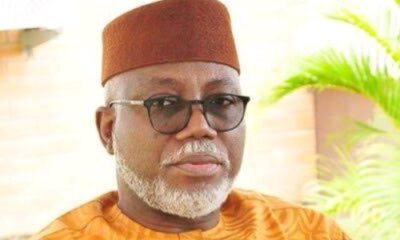
 BIG STORY2 days ago
BIG STORY2 days ago
 BIG STORY4 days ago
BIG STORY4 days ago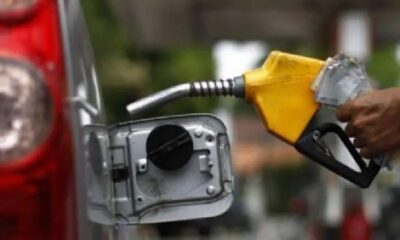
 BIG STORY2 days ago
BIG STORY2 days ago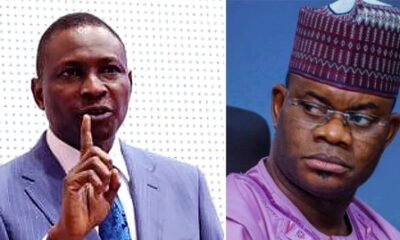
 BIG STORY3 days ago
BIG STORY3 days ago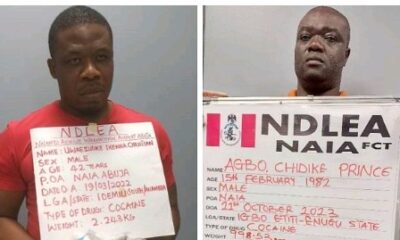
 BIG STORY2 days ago
BIG STORY2 days ago
 BIG STORY10 hours ago
BIG STORY10 hours ago










